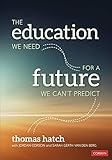The education we need for a future we can't predict / Thomas Hatch with Jordan Corson and Sarah Gerth van den Berg.
Material type: TextPublisher: Thousand Oaks, CA : Corwin, 2021Description: xxxvi, 205 pages : illustrations ; 26 cmContent type:
TextPublisher: Thousand Oaks, CA : Corwin, 2021Description: xxxvi, 205 pages : illustrations ; 26 cmContent type: - text
- unmediated
- volume
- 9781071802083
- 371.207 HAT 23 020771
| Item type | Current library | Call number | Status | Date due | Barcode |
|---|---|---|---|---|---|
 Book
Book
|
Indian Institute for Human Settlements, Bangalore | 371.207 HAT 020771 (Browse shelf(Opens below)) | Available | 020771 |
Includes bibliographical references and index.
Increasing access and quality -- Establishing equitable learning opportunities -- Learning with purpose -- The "grammar of schooling" always pushes back -- Beliefs endure but times change -- From common concerns to high leverage problems -- Solving problems and developing micro-innovations -- The conditions for learning -- From possibilities to practice -- Capacity building -- Coherence and common understanding -- Collective responsibility -- From improvements to movements -- The problems and possibilities for improvement in every system.
"This book confronts the fundamental problem where schools have improved for some children, while other children continue to remain left out and left behind. As a result, educators face a fundamental question: Should we continue to improve the schools we have in the hope that we can make them work for all? Or should we radically transform schools assuming the current system will never work for everyone? This book is designed to show that we can do both: we can make the schools we have more efficient, more effective, and more equitable at the same time that we create more powerful opportunities to support all aspects of students' development both inside and outside schools. All educational improvement efforts face the challenge of changing the "grammar of schooling" - the conventional structures, practices, and beliefs - that define educational experiences for so many children. Those who seek to improve educational outcomes have to confront the fundamental reality that the more radical their approaches are, the more difficult it will be for those approaches to take hold and to spread across many schools and communities"--


There are no comments on this title.